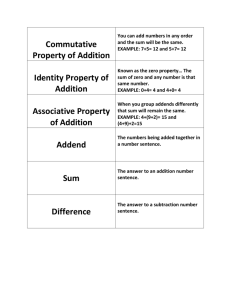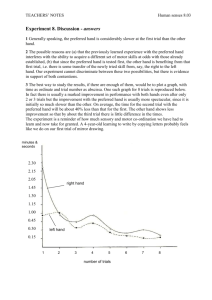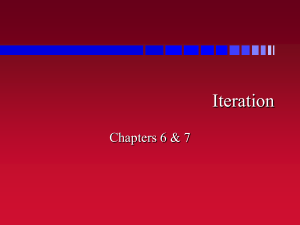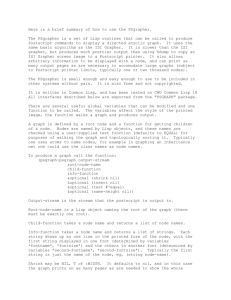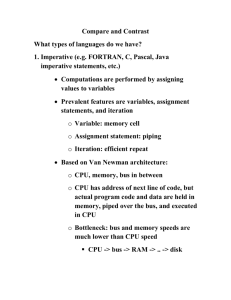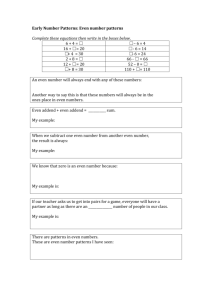There are only 2 new commands used in the models for this unit and
advertisement
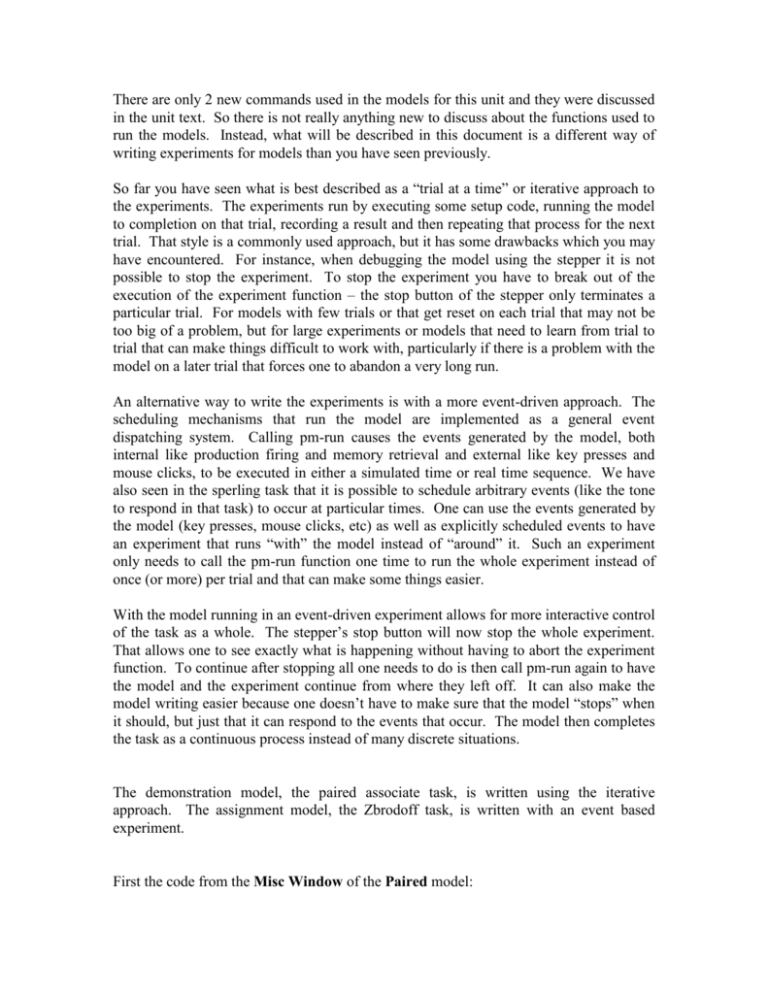
There are only 2 new commands used in the models for this unit and they were discussed
in the unit text. So there is not really anything new to discuss about the functions used to
run the models. Instead, what will be described in this document is a different way of
writing experiments for models than you have seen previously.
So far you have seen what is best described as a “trial at a time” or iterative approach to
the experiments. The experiments run by executing some setup code, running the model
to completion on that trial, recording a result and then repeating that process for the next
trial. That style is a commonly used approach, but it has some drawbacks which you may
have encountered. For instance, when debugging the model using the stepper it is not
possible to stop the experiment. To stop the experiment you have to break out of the
execution of the experiment function – the stop button of the stepper only terminates a
particular trial. For models with few trials or that get reset on each trial that may not be
too big of a problem, but for large experiments or models that need to learn from trial to
trial that can make things difficult to work with, particularly if there is a problem with the
model on a later trial that forces one to abandon a very long run.
An alternative way to write the experiments is with a more event-driven approach. The
scheduling mechanisms that run the model are implemented as a general event
dispatching system. Calling pm-run causes the events generated by the model, both
internal like production firing and memory retrieval and external like key presses and
mouse clicks, to be executed in either a simulated time or real time sequence. We have
also seen in the sperling task that it is possible to schedule arbitrary events (like the tone
to respond in that task) to occur at particular times. One can use the events generated by
the model (key presses, mouse clicks, etc) as well as explicitly scheduled events to have
an experiment that runs “with” the model instead of “around” it. Such an experiment
only needs to call the pm-run function one time to run the whole experiment instead of
once (or more) per trial and that can make some things easier.
With the model running in an event-driven experiment allows for more interactive control
of the task as a whole. The stepper’s stop button will now stop the whole experiment.
That allows one to see exactly what is happening without having to abort the experiment
function. To continue after stopping all one needs to do is then call pm-run again to have
the model and the experiment continue from where they left off. It can also make the
model writing easier because one doesn’t have to make sure that the model “stops” when
it should, but just that it can respond to the events that occur. The model then completes
the task as a continuous process instead of many discrete situations.
The demonstration model, the paired associate task, is written using the iterative
approach. The assignment model, the Zbrodoff task, is written with an event based
experiment.
First the code from the Misc Window of the Paired model:
(defvar *response* nil)
(defvar *response-time* nil)
(defvar *pairs* '(("bank"
("game"
("lamb"
("quip"
("vent"
"0")
"4")
"8")
"2")
"6")
("card"
("hand"
("mask"
("rope"
("wall"
"1")
"5")
"9")
"3")
"7")
("dart"
("jack"
("neck"
("sock"
("xray"
"2")
"6")
"0")
"4")
"8")
("face"
("king"
("pipe"
("tent"
("zinc"
"3")
"7")
"1")
"5")
"9")))
(defconstant *paired-latencies* '(0.0 2.158 1.967 1.762 1.68 1.552 1.467 1.402))
(defconstant *paired-probability* '(0.000 .526 .667 .798 .887 .924 .958 .954))
(defun do-experiment (size trials)
(if *actr-enabled-p*
(do-experiment-model size trials)
(do-experiment-person size trials)))
(defun do-experiment-model (size trials)
(let ((result nil)
(window (open-exp-window "Paired-Associate Experiment" :visible t)))
(reset)
(pm-install-device window)
(dotimes (i trials)
(let ((score 0.0)
(time 0.0)
(start-time))
(dolist (x (permute-list (subseq *pairs* (- 20 size))))
(clear-exp-window)
(add-text-to-exp-window :text (car x) :x 150 :y 150)
(setf *response* nil)
(setf *response-time* nil)
(setf start-time (pm-get-time))
(pm-proc-display)
(pm-run 5.0 :full-time t)
(when (equal (second x) *response*)
(incf score 1.0)
(incf time (- *response-time* start-time)))
(clear-exp-window)
(add-text-to-exp-window :text (second x) :x 150 :y 150)
(pm-proc-display)
(pm-run 5.0 :full-time t))
(push (list (/ score size) (and (> score 0) (/ time (* score 1000.0))))
result)))
(reverse result)))
(defun do-experiment-person (size trials)
(let ((result nil)
(window (open-exp-window "Paired-Associate Experiment" :visible t)))
(dotimes (i trials)
(let ((score 0.0)
(time 0.0)
(start-time))
(dolist (x (permute-list (subseq *pairs* (- 20 size))))
(clear-exp-window)
(add-text-to-exp-window :text (car x) :x 150 :y 150 :width 50)
(setf *response* nil)
(setf *response-time* nil)
(setf start-time (pm-get-time))
(while (< (- (pm-get-time) start-time) 5000)
(allow-event-manager window))
(when (equal (second x) *response*)
(incf score 1.0)
(incf time (/ (- *response-time* start-time) 1000.0)))
(clear-exp-window)
(add-text-to-exp-window :text (second x) :x 150 :y 150)
(sleep 5.0))
(push (list (/ score size) (and (> score 0) (/ time score))) result)))
;; return the list of scores
(reverse result)))
(defun collect-data (n)
(do ((count 1 (1+ count))
(results (do-experiment 20 8)
(mapcar #'(lambda (lis1 lis2)
(list (+ (first lis1) (first lis2))
(+ (or (second lis1) 0)
(or (second lis2) 0))))
results (do-experiment 20 8))))
((equal count n)
(output-data results n))))
(defun output-data (data n)
(let ((probability (mapcar #'(lambda (x) (/ (first x) n)) data))
(latency (mapcar #'(lambda (x) (/ (or (second x) 0) n)) data)))
(print-results latency *paired-latencies* "Latency")
(print-results probability *paired-probability* "Accuracy")))
(defun print-results (predicted data label)
(format t "~%~%~A:~%" label)
(correlation predicted data)
(mean-deviation predicted data)
(format t "Trial
1
2
3
8~%")
(format t "
~{~8,3f~}~%" predicted))
4
5
6
(defmethod rpm-window-key-event-handler ((win rpm-window) key)
(setf *response* (string-upcase (string key)))
(setf *response-time* (pm-get-time)))
and then the code from the Commands Window:
(sgp :rt -2 :lf 0.35 :ans 0.5 :bll 0.5 :ga 0 :pm nil :esc t :v t)
(setf *actr-enabled-p* t)
(goal-focus goal)
The call to sgp has a few new parameters.
(sgp :rt -2 :lf 0.35 :ans 0.5 :bll 0.5 :ga 0 :pm nil :esc t :v t)
7
:rt is the retrieval threshold which sets minimum activation a chunk can have and still be
retrieved. :lf is the latency factor and is the F value in the retrieval time equation. :ans is
the s value for the transient activation noise. :bll is the base level learning parameter and
it is used to both enable base level learning (when it is non-nil) and to specify the d
parameter for the base level learning equation. The recommended value when enabling it
is .5. That value has worked in a vast number of models, and unless you have a good
reason for using a different value it should not be used as a free parameter when fitting
data. The :ga and :pm parameters will be described in the next unit. Here they are set to
remove the effects of context on activation so that the model demonstrates only the
effects of base-level learning on activation.
The rest of the code there should be very familiar by now.
(setf *actr-enabled-p* t)
(goal-focus goal)
Now we will look at the code from the Misc window. First we define the global variables
to hold the key response and time.
(defvar *response* nil)
(defvar *response-time* nil)
Then we define a list of the stimuli to be presented in the task.
(defvar *pairs* '(("bank"
("game"
("lamb"
("quip"
("vent"
"0")
"4")
"8")
"2")
"6")
("card"
("hand"
("mask"
("rope"
("wall"
"1")
"5")
"9")
"3")
"7")
("dart"
("jack"
("neck"
("sock"
("xray"
"2")
"6")
"0")
"4")
"8")
("face"
("king"
("pipe"
("tent"
("zinc"
"3")
"7")
"1")
"5")
"9")))
The experimental data is defined in global constants.
(defconstant *paired-latencies* '(0.0 2.158 1.967 1.762 1.68 1.552 1.467 1.402))
(defconstant *paired-probability* '(0.000 .526 .667 .798 .887 .924 .958 .954))
The do-experiment function takes two parameters which are the number of pairs to
present in a trial and the number of trials to run. It calls the appropriate function to run
the task based on whether it’s the model or a person running as a participant.
(defun do-experiment (size trials)
(if *actr-enabled-p*
(do-experiment-model size trials)
(do-experiment-person size trials)))
The do-experiment-model function takes two parameters which are the number of pairs to
present in a trial and the number of trials to run. It runs the experiment for the size and
number of trials requested and returns a list of lists. There is one sublist for each of the
trials and they are in the order of presentation. Each of the sublists contains the
percentage of answers correct and the average response time for the correct answers in the
corresponding trial.
(defun do-experiment-model (size trials)
Start by defining a variable to hold the results and opening a window for the task.
(let ((result nil)
(window (open-exp-window "Paired-Associate Experiment" :visible t)))
Reset the model and tell it which window to interact with.
(reset)
(pm-install-device window)
Repeat for the required number of trials.
(dotimes (i trials)
Declare some local variables to hold the score and timing information.
(let ((score 0.0)
(time 0.0)
(start-time))
Iterate over a randomized list of the required number of stimuli from the global set.
(dolist (x (permute-list (subseq *pairs* (- 20 size))))
Clear the window and present the word from the pair.
(clear-exp-window)
(add-text-to-exp-window :text (car x) :x 150 :y 150)
Clear the response variables and record the trial start time.
(setf *response* nil)
(setf *response-time* nil)
(setf start-time (pm-get-time))
Have the model process the display and run for 5 seconds.
(pm-proc-display)
(pm-run 5.0 :full-time t)
If the answer provided was correct increment the score and the cumulative response time.
(when (equal (second x) *response*)
(incf score 1.0)
(incf time (- *response-time* start-time)))
Clear the window and display the correct answer.
(clear-exp-window)
(add-text-to-exp-window :text (second x) :x 150 :y 150)
Have the model process the display and run for 5 seconds.
(pm-proc-display)
(pm-run 5.0 :full-time t))
Compute the response results for the trial and save it on the list of results.
(push (list (/ score size) (and (> score 0) (/ time (* score 1000.0))))
result)))
Return the list of results in the proper order.
(reverse result)))
The do-experiment-person function operates just like the do-experiment-model function
except that it waits for a response from a person instead of running the model.
(defun do-experiment-person (size trials)
(let ((result nil)
(window (open-exp-window "Paired-Associate Experiment" :visible t)))
(dotimes (i trials)
(let ((score 0.0)
(time 0.0)
(start-time))
(dolist (x (permute-list (subseq *pairs* (- 20 size))))
(clear-exp-window)
(add-text-to-exp-window :text (car x) :x 150 :y 150 :width 50)
(setf *response* nil)
(setf *response-time* nil)
(setf start-time (pm-get-time))
(while (< (- (pm-get-time) start-time) 5000)
(allow-event-manager window))
(when (equal (second x) *response*)
(incf score 1.0)
(incf time (/ (- *response-time* start-time) 1000.0)))
(clear-exp-window)
(add-text-to-exp-window :text (second x) :x 150 :y 150)
(sleep 5.0))
(push (list (/ score size) (and (> score 0) (/ time score))) result)))
;; return the list of scores
(reverse result)))
The collect-data function takes one parameter which is the number of times to repeat the
full experiment. The experiment with 20 pairs and 8 trials is run that many times and the
results are averaged and compared to the experimental results.
(defun collect-data (n)
(do ((count 1 (1+ count))
(results (do-experiment 20 8)
(mapcar #'(lambda (lis1 lis2)
(list (+ (first lis1) (first lis2))
(+ (or (second lis1) 0)
(or (second lis2) 0))))
results (do-experiment 20 8))))
((equal count n)
(output-data results n))))
The output-data function takes two parameters. The first is a list of cumulative data from
running multiple iterations of the experiment and the second parameter indicates how
many repetitions were added into that cumulative data. It averages that data and then
calls print-results to display the comparison and table for both the latency and accuracy
data.
(defun output-data (data n)
(let ((probability (mapcar #'(lambda (x) (/ (first x) n)) data))
(latency (mapcar #'(lambda (x) (/ (or (second x) 0) n)) data)))
(print-results latency *paired-latencies* "Latency")
(print-results probability *paired-probability* "Accuracy")))
The print-results function takes three parameters. The first is the list of data from running
the experiment. The second is the experimental results for that data, and the third is the
label to print when displaying that data. The new data is compared to the experimental
results and printed along with a table of the new data.
(defun print-results (predicted data label)
(format t "~%~%~A:~%" label)
(correlation predicted data)
(mean-deviation predicted data)
(format t "Trial
1
2
3
8~%")
(format t "
~{~8,3f~}~%" predicted))
4
5
6
7
The key handler for the window just records the key press and the time of that press in the
global variables.
(defmethod rpm-window-key-event-handler ((win rpm-window) key)
(setf *response* (string-upcase (string key)))
(setf *response-time* (pm-get-time)))
The other model for this unit is the Zbrodoff task and is written using the event-based
approach. Because this is a more complex experiment than most you have seen, there are
some slightly more advanced Lisp facilities used to help keep things clearer and easier to
use. Here is the code from the Misc window:
(defvar
(defvar
(defvar
(defvar
(defvar
*trials*)
*results*)
*start-time*)
*block*)
*show-window*)
(defconstant *zbrodoff-control-data* '(1.84 2.46 2.82 1.21 1.45 1.42 1.14 1.21
1.17))
(defstruct trial block addend1 addend2 sum answer visible)
(defstruct response block addend correct time)
(defun present-trial (trial)
(let ((window (open-exp-window "Alpha-arithmetic Experiment" :visible (trialvisible trial))))
(add-text-to-exp-window
(add-text-to-exp-window
(add-text-to-exp-window
(add-text-to-exp-window
(add-text-to-exp-window
:text
:text
:text
:text
:text
(trial-addend1 trial) :x
"+" :x 125 :y 150 :width
(trial-addend2 trial) :x
"=" :x 175 :y 150 :width
(trial-sum trial) :x 200
100 :y 150 :width 25)
25)
150 :y 150 :width 25)
25)
:y 150 :width 25)
(pm-install-device window)
(pm-proc-display :clear t)
(setf *start-time* (pm-get-time))
window))
(defmethod rpm-window-key-event-handler ((win rpm-window) key)
(let ((trial (pop *trials*)))
(push (make-response :block (trial-block trial)
:addend (trial-addend2 trial)
:time (/ (- (pm-get-time) *start-time*) 1000.0)
:correct (string-equal (trial-answer trial) (string
key)))
*results*)
(when *trials*
(present-trial (first *trials*)))))
(defun collect-responses (trial-count)
(setf *results* nil)
(let ((window (present-trial (first *trials*))))
(if *actr-enabled-p*
(pm-run (* 10 trial-count))
(while (< (length *results*) trial-count)
(allow-event-manager window)))))
(defun do-trial (addend1 addend2 sum answer &optional (visible (not *actrenabled-p*)))
(setf *show-window* visible)
(setf *block* 1)
(setf *trials* (list (construct-trial (list addend1 addend2 sum answer))))
(collect-responses 1)
(analyze-results))
(defun do-set (&optional (visible (not *actr-enabled-p*)))
(setf *show-window* visible)
(setf *block* 1)
(setf *trials* (create-set))
(collect-responses 24)
(analyze-results))
(defun do-block (&optional (visible (not *actr-enabled-p*)))
(setf *show-window* visible)
(setf *block* 1)
(setf *trials* nil)
(dotimes (i 8)
(setf *trials* (append *trials* (create-set))))
(collect-responses 192)
(analyze-results))
(defun do-experiment (&optional (visible (not *actr-enabled-p*)) (display t))
(reset)
(setf *show-window* visible)
(setf *trials* nil)
(dotimes (j 3)
(setf *block* (+ j 1))
(dotimes (i 8)
(setf *trials* (append *trials* (create-set)))))
(collect-responses 576)
(analyze-results display))
(defun collect-data (n)
(let ((results nil))
(dotimes (i n)
(push (do-experiment nil nil) results))
(let ((rts (mapcar #'(lambda (x) (/ x (length results)))
(apply #'mapcar #'+ (mapcar #'first results))))
(counts (mapcar #'(lambda (x) (truncate x (length results)))
(apply #'mapcar #'+ (mapcar #'second results)))))
(correlation rts *zbrodoff-control-data*)
(mean-deviation rts *zbrodoff-control-data*)
(print-analysis rts counts '(1 2 3) '("2" "3" "4") '(64 64 64)))))
(defun analyze-results (&optional (display t))
(let ((blocks (sort (remove-duplicates (mapcar #'response-block *results*))
#'<))
(addends (sort (remove-duplicates (mapcar #'response-addend *results*)
:test #'string-equal) #'string<))
(counts nil)
(rts nil)
(total-counts nil))
(setf total-counts (mapcar #'(lambda (x)
(/ (count x *results*
:key #'response-addend
:test #'string=)
(length blocks)))
addends))
(dolist (x blocks)
(dolist (y addends)
(let ((data (mapcar #'response-time
(remove-if-not #'(lambda (z)
(and (response-correct z)
(string= y (response-addend z))
(= x (response-block z))))
*results*))))
(push (length data) counts)
(push (/ (apply #'+ data) (max 1 (length data))) rts))))
(when display
(print-analysis
counts))
(reverse
rts)
(reverse
counts)
blocks
addends
total-
(list (reverse rts) (reverse counts))))
(defun print-analysis (rts counts blocks addends total-counts)
(format t "~%
")
(dotimes (addend (length addends))
(format t " ~6@a (~2d)" (nth addend addends) (nth addend total-counts)))
(dotimes (block (length blocks))
(format t "~%Block ~2d" (nth block blocks))
(dotimes (addend (length addends))
(format t " ~6,3f (~2d)" (nth (+ addend (* block (length addends))) rts)
(nth (+ addend (* block (length addends))) counts))))
(terpri))
(defun create-set ()
(permute-list (mapcar #'construct-trial
'(("a" "2" "c" "k")("d"
("b" "3" "e" "k")("e"
("c" "4" "g" "k")("f"
("a" "2" "d" "d")("d"
("b" "3" "f" "d")("e"
"2"
"3"
"4"
"2"
"3"
"f"
"h"
"j"
"g"
"i"
"k")
"k")
"k")
"d")
"d")
("c"
("a"
("b"
("c"
("a"
("b"
("c"
"4"
"2"
"3"
"4"
"2"
"3"
"4"
"h"
"c"
"e"
"g"
"d"
"f"
"h"
"d")("f"
"k")("d"
"k")("e"
"k")("f"
"d")("d"
"d")("e"
"d")("f"
"4"
"2"
"3"
"4"
"2"
"3"
"4"
"k"
"f"
"h"
"j"
"g"
"i"
"k"
"d")
"k")
"k")
"k")
"d")
"d")
"d")))))
(defun construct-trial (settings)
(make-trial :block *block*
:addend1 (first settings)
:addend2 (second settings)
:sum (third settings)
:answer (fourth settings)
:visible *show-window*))
and here is the code from the Commands window:
(pm-set-params :show-focus t)
(sgp :v t :esc t :ga 0 :lf 0.35 :bll 0.5 :ans 0.5 :rt 0)
(setf *actr-enabled-p* t)
(setallbaselevels 10000000 -1000)
(add-dm-fct '((goal isa problem)))
(goal-focus goal)
Much of the code in the Commands window is similar to that from all the other units.
The parameters used in the sgp call are:
(sgp :v t :esc t :ga 0 :lf 0.35 :bll 0.5 :ans 0.5 :rt 0)
It sets the parameters described in the unit – latency factor (:lf), base-level decay (:bll),
the activation noise s value (:ans) and the retrieval threshold (:rt). The :ga parameter will
be described in the next unit. Setting it to 0 essentially turns off the effect of context on
activations to simplify the task for this unit.
The new functions used are the following two calls which are discussed in the unit text.
(setallbaselevels 10000000 -1000)
(add-dm-fct '((goal isa problem)))
Thus we will go on to the description of the code in the Misc window.
Start by defining some global variables to hold the trials to present, the results collected,
the start time of a trial, a block count, and flag to specify whether or not to show the
window. This already shows some difference from the iterative approach because instead
of storing the responses in globals which are collected by the “do-trial” type function the
results are stored directly in a global variable for later use. Similarly, the trials are also
stored in a global variable instead of being iterated over within a function.
(defvar *trials*)
(defvar *results*)
(defvar *start-time*)
(defvar *block*)
(defvar *show-window*)
Then define the global constant that holds the experimental results.
(defconstant *zbrodoff-control-data* '(1.84 2.46 2.82 1.21 1.45 1.42 1.14 1.21
1.17))
Instead of using lists to represent the information in a trial and to describe a response we
create some abstract structures to hold that data in a more descriptive format. A trial
consists of a block number, the two addends to present, a sum to present, the correct
answer, and whether or not to display the trial in a real window. A response contains the
block in which it was given, the numeric addend of the trial (2,3, or 4), whether the
response was correct and the response time.
(defstruct trial block addend1 addend2 sum answer visible)
(defstruct response block addend correct time)
The present-trial function takes one parameter which is a trial structure. It does the same
thing whether it is a person or a model performing the task.
(defun present-trial (trial)
It opens a window and presents the equation.
(let ((window (open-exp-window "Alpha-arithmetic Experiment" :visible (trialvisible trial))))
(add-text-to-exp-window
(add-text-to-exp-window
(add-text-to-exp-window
(add-text-to-exp-window
(add-text-to-exp-window
:text
:text
:text
:text
:text
(trial-addend1 trial) :x
"+" :x 125 :y 150 :width
(trial-addend2 trial) :x
"=" :x 175 :y 150 :width
(trial-sum trial) :x 200
100 :y 150 :width 25)
25)
150 :y 150 :width 25)
25)
:y 150 :width 25)
Then it sets that window as the one for the model to look at and processes it (if a person
is doing the task that has no effect).
(pm-install-device window)
(pm-proc-display :clear t)
The time the trial starts is recorded in a global variable.
(setf *start-time* (pm-get-time))
The window being used is then returned.
window))
The key handler for the task does more for the experiment in an event-based experiment.
(defmethod rpm-window-key-event-handler ((win rpm-window) key)
The current trial is removed from the global list of trials.
(let ((trial (pop *trials*)))
A structure that represents the response is then added to the global list of responses.
(push (make-response :block (trial-block trial)
:addend (trial-addend2 trial)
:time (/ (- (pm-get-time) *start-time*) 1000.0)
:correct (string-equal (trial-answer trial) (string
key)))
*results*)
If there are more trials to present, then the next one is presented. This is the critical
difference between the iterative and event-based experiments. In the event-based
experiment the participant’s response leads directly to the presentation of the next trial.
(when *trials*
(present-trial (first *trials*)))))
The collect-responses function takes one parameter which is the number of trials that are
to be run.
(defun collect-responses (trial-count)
The global set of results is cleared.
(setf *results* nil)
The first trial is presented.
(let ((window (present-trial (first *trials*))))
If the model is performing the task then it is run for up to 10 seconds times the number of
trials that need to be collected.
(if *actr-enabled-p*
(pm-run (* 10 trial-count))
If a person is performing the task then the system waits for the appropriate number of
responses to be recorded.
(while (< (length *results*) trial-count)
(allow-event-manager window)))))
The do-trial function takes four required parameters and one optional parameter. The
four required parameters are the strings that represent the equation to present, for example
“A” “2” and “C”, and the string indicating the correct response – either “K” for correct or
“D” for incorrect. The optional parameter defaults to the negation of whether or not the
model is doing the task. Thus, if the model is doing the task visible is nil in which case
the window will be kept virtual and if a person is doing the task the window will be
shown. Providing a value of t for the fifth parameter will cause the window to be
displayed while the model is doing the task.
(defun do-trial (addend1 addend2 sum answer &optional
enabled-p*)))
(visible (not *actr-
Set the global values to indicate whether to show the window and which block is being
presented.
(setf *show-window* visible)
(setf *block* 1)
This is only one trial, so set the list of trials to a list of only one trial.
(setf *trials* (list (construct-trial (list addend1 addend2 sum answer))))
Call collect-responses to perform the task and then analyze the results.
(collect-responses 1)
(analyze-results))
The do-set function takes one optional parameter as described above for do-trial. It runs
once through a random permutation of the set of equations. A set is two instances of each
of the equations with the addends (2, 3, and 4) in each of the true and false conditions
which is a total of 24 problems.
(defun do-set (&optional (visible (not *actr-enabled-p*)))
(setf *show-window* visible)
(setf *block* 1)
(setf *trials* (create-set))
(collect-responses 24)
(analyze-results))
The do-set function takes one optional parameter as described above for do-trial. It runs
one block of the experiment, which is eight repetitions of the set of equations, or a total of
192 problems.
(defun do-block (&optional (visible (not *actr-enabled-p*)))
(setf *show-window* visible)
(setf *block* 1)
(setf *trials* nil)
(dotimes (i 8)
(setf *trials* (append *trials* (create-set))))
(collect-responses 192)
(analyze-results))
The do-experiment function runs one iteration of the experiment, which is three full
blocks, or a total of 576 trials. It takes two optional parameters. The first is to control
whether the window is shown or not as with the previous functions. The other controls
whether the analysis is printed. The default is to have the analysis printed. Note that this
function also calls reset to return the model to its initial condition. It is the only function
in the experiment to do so the others allow the model to maintain all the information it
has gained (which is mostly the history of chunk use).
(defun do-experiment (&optional (visible (not *actr-enabled-p*)) (display t))
(reset)
(setf *show-window* visible)
(setf *trials* nil)
(dotimes (j 3)
(setf *block* (+ j 1))
(dotimes (i 8)
(setf *trials* (append *trials* (create-set)))))
(collect-responses 576)
(analyze-results display))
The collect-data function takes one parameter, which is the number of times to run the
whole experiment. It runs that many times through the experiment collecting the data
which is then averaged and compared to the original experiment’s results. It assumes that
a model will be running the task and forces the experiment window to be virtual.
(defun collect-data (n)
(let ((results nil))
Run the experiment n times with a virtual window and without displaying the individual
analysis of each run.
(dotimes (i n)
(push (do-experiment nil nil) results))
Compute the average of the response times and number of correct answers.
(let ((rts (mapcar #'(lambda (x) (/ x (length results)))
(apply #'mapcar #'+ (mapcar #'first results))))
(counts (mapcar #'(lambda (x) (truncate x (length results)))
(apply #'mapcar #'+ (mapcar #'second results)))))
Display the data fit between the current run and the experimental data and print the table
of the results.
(correlation rts *zbrodoff-control-data*)
(mean-deviation rts *zbrodoff-control-data*)
(print-analysis rts counts '(1 2 3) '("2" "3" "4") '(64 64 64)))))
The analyze-results function takes one optional parameter which controls whether or not
the data table is displayed. It computes the average response time and number of correct
responses in the *results* global variable as a function of the number of blocks presented
and the numerical addend.
(defun analyze-results (&optional (display t))
(let ((blocks (sort (remove-duplicates (mapcar #'response-block *results*))
#'<))
(addends (sort (remove-duplicates (mapcar #'response-addend *results*)
:test #'string-equal) #'string<))
(counts nil)
(rts nil)
(total-counts nil))
(setf total-counts (mapcar #'(lambda (x)
(/ (count x *results*
:key #'response-addend
:test #'string=)
(length blocks)))
addends))
(dolist (x blocks)
(dolist (y addends)
(let ((data (mapcar #'response-time
(remove-if-not #'(lambda (z)
(and (response-correct z)
(string= y (response-addend z))
(= x (response-block z))))
*results*))))
(push (length data) counts)
(push (/ (apply #'+ data) (max 1 (length data))) rts))))
(when display
(print-analysis
counts))
(reverse
rts)
(reverse
counts)
blocks
addends
total-
(list (reverse rts) (reverse counts))))
The print-analysis function takes five parameters that describe a set of data for the task.
The data is a list of response times and a list of corresponding correct answers. Then
there are two lists that indicate the blocks and addend conditions represented in the data
and finally a list of the total number of correct trials in each addend condition. Those
data are then displayed in a table.
(defun print-analysis (rts counts blocks addends total-counts)
(format t "~%
")
(dotimes (addend (length addends))
(format t " ~6@a (~2d)" (nth addend addends) (nth addend total-counts)))
(dotimes (block (length blocks))
(format t "~%Block ~2d" (nth block blocks))
(dotimes (addend (length addends))
(format t " ~6,3f (~2d)" (nth (+ addend (* block (length addends))) rts)
(nth (+ addend (* block (length addends))) counts))))
(terpri))
The create-set function takes no parameters. It returns a randomly ordered list of 24 trial
structures that make up one set of the control condition of the experiment.
(defun create-set ()
(permute-list (mapcar #'construct-trial
'(("a" "2" "c" "k")("d"
("b" "3" "e" "k")("e"
("c" "4" "g" "k")("f"
("a" "2" "d" "d")("d"
("b" "3" "f" "d")("e"
("c" "4" "h" "d")("f"
("a" "2" "c" "k")("d"
("b" "3" "e" "k")("e"
("c" "4" "g" "k")("f"
("a" "2" "d" "d")("d"
("b" "3" "f" "d")("e"
("c" "4" "h" "d")("f"
"2"
"3"
"4"
"2"
"3"
"4"
"2"
"3"
"4"
"2"
"3"
"4"
"f"
"h"
"j"
"g"
"i"
"k"
"f"
"h"
"j"
"g"
"i"
"k"
"k")
"k")
"k")
"d")
"d")
"d")
"k")
"k")
"k")
"d")
"d")
"d")))))
The construct-trial function takes one parameter which is a list of 4 strings that represent
a trial in the task. The first three strings are the elements of the equation to display and
the fourth is the key that should be pressed for a correct response. It returns a trial
structure with the appropriate slot values set.
(defun construct-trial (settings)
(make-trial :block *block*
:addend1 (first settings)
:addend2 (second settings)
:sum (third settings)
:answer (fourth settings)
:visible *show-window*))
